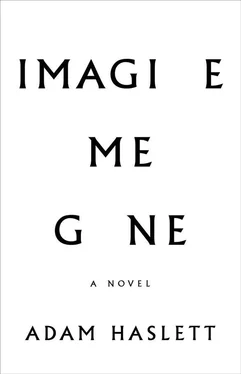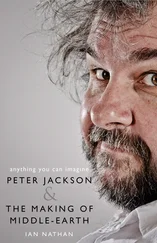I more or less agreed with her, at least until yesterday morning. I don’t know if you remember how you left that long message on our machine about transatlantic crossings during hurricane season, and then sent Mom that clipping a couple of days before we left about the cruise ship in the Caribbean that got slammed by a huge tropical storm, resulting in several fatalities, but let me just say: you were right. They can talk all they want about their radar and stabilizers but as you’ve probably read in the paper already, Esmeralda, that category 3 that grazed the Outer Banks and then hung a right into the North Atlantic a few days ago, well, it reached us at about six a.m. yesterday. They canceled breakfast and told everyone to remain in their cabins, probably because they wanted to prevent people from vomiting on the upholstery in the common areas. Through our porthole Celia and I watched the gale-sheared mountains of water carve valleys beneath us before striking the ship and covering the glass entirely, like we were in an aquarium, the waves crashing onto the deck high above us, sending us onto the listing floor along with the luggage knocked from the closets.
I won’t lie. It was a rough day. Dad took it all in stride, telling us stories about sailing as a boy to the Isle of Wight in choppy seas. He said there was no chance of us sinking, just a bit of broken china and a lot of sick passengers. In point of fact, a female honeymooner
was
washed off the stern, though her husband’s spinal injury from that same incident wasn’t nearly as serious as first reports suggested. Of course we thought about Mom in the infirmary, swinging from her pinioned leg for all we knew, but they’d powered off the elevators and we weren’t about to climb six flights to check on her, or on the deregulator, who’s boarded in the kennel up by the funnels. Frankly, I am more worried about Alec now that someone definitely
has
gone overboard. Still, Celia and I were vomiting all day and it turns out there’s only so much you can worry about when you’re vomiting.
That said, yesterday probably sounds more dire than it was. The worst of the storm passed to our west and by nightfall the skies had cleared and the temperature dropped a good twenty degrees. We ate up the week’s worth of snacks we’d brought with us (no dinner service) and went to bed early.
It wasn’t until this morning that I finally had time to sit down and write you this letter. I haven’t seen any small craft coming up alongside the ship and certainly no helicopter, so I’m not sure exactly how it’s supposed to get posted but I wanted to try to get word to you one way or another. Whatever you do, don’t worry about us. We’ve got another four days to Southampton, and they promise to be much calmer than the last four. Meantime, everyone here sends their best.
Yours,
Michael
August 29
Dear Aunt Penny,
As I wrote the day before last, not sure when this will reach you, but I know you’ll be keen for an update so am stealing a few minutes here in the casino to toss off this missive. There’s no sign of Alec yet, though Celia is pretty sure she saw him from the promenade deck exiting the pool area after breakfast. On the whole, though, things on the ship are getting back to normal since the storm.
And you’re never going to believe this! Guess who’s on board? Guess who I’m sitting just three one-armed bandits away from right this very second? Donna Summer! I am not even kidding. It turns out, unbeknownst to me — why Mom and Dad didn’t have the wit to tell me months ago, God only knows — she is the main stage entertainment for the crossing! I can’t imagine how much dough they had to drop to get her (maybe she gets a free cabin?) but whatever they paid is worth it.
The evening shows are twenty-one-plus, but it’s dark and crowded by the entrance and last night I managed to squeeze in undetected and stand behind a dormant food cart. Needless to say, I’ve listened to her records more times than I’ve had hot dinners. I must have worn down a dozen needles on “MacArthur Park” alone. I packed five of her cassettes for the trip (the other twelve are in the crates). As you no doubt already realize, she is the avatar of an entirely new dispensation, machine-driven but secretly brokenhearted. I am convinced she is aware of this but tortured by it. “This monstrous, monstrous force.” That’s how she described her career to
Rolling Stone.
“This whole production of people and props that you’re responsible for, by audiences and everything that rules you until you take it upon yourself to be a
machine.
And at some point a machine breaks down.” She’s all carved up by ears and eyes like mine. I’m part of that monstrous force. And I can’t help it. The music is salvific.
So there she was, live, in person, in the same room as me, in dazzling white sequins and bloodred lip gloss and metallic-blue eye shadow, her upper lip and nose flaring slightly heavenward, just like on the album covers (did you know she grew up in Dorchester?), and her long painted fingernails wrapped tightly around her wireless black mic. That audience of luxury-craft pikers had no concept of her larger significance. They were just there to digest.
I don’t know how closely you followed the controversy over her first American twelve-inch, “Love to Love You Baby” (Oasis/Casablanca, 1975), but you may remember that’s the one the BBC refused to promote and a bunch of U.S. stations wouldn’t play because of the moaning sounds she made on the track, which simulated — maybe you’ll think I’m too young to say this — climax? Apparently, when she recorded it (Musicland Studios, Munich, May — June 1975), she asked for the lights to be turned down and sang the lyrics lying on a sofa imagining herself as Marilyn Monroe. Hard to confirm, obviously, but it makes sense when you hear that cooing-whispering tone in the first few verses — she did it live, too — and then those throaty ecstatic passages that whipped the scolds into a flurry.
As of this writing, she is sitting about six feet from me feeding a slot machine, dressed in a nautical-themed outfit of white cotton pants, a navy linen blazer, and the largest sunglasses I’ve ever seen (it’s pure Halston). She’s with this tricked-out Italian guy with an Afro and a handlebar mustache and sunglasses almost as big as hers, whom I believe to be none other than
Giorgio Moroder,
her producer and collaborator, who at this point you’d have to say is really one of the fathers of disco (I promise, Aunt Penny, I’ve never done coke, but I feel certain that he has).
I have no urge to talk to them, though. What would be the point? They could have no conceivable interest in me as a social matter, and all I could say is what they already know: that they are changing the course of history. When she sang “Love to Love You Baby” last night it left me weak-kneed. And yet even that did little to prepare me for her encore, “Our Love.” Are you familiar with that particular assault on the soul? It’s on side four of
Bad Girls
but didn’t get much radio play until a few months ago when they released it as the B-side on the “Sunset People” twelve-inch (“Sunset People” itself is anemic, just a bloodless, dialed-in glorification of LA nightlife, not one of their better outings). But “Our Love” is epochal. Short of nailing this letter to a copy of the twelve-inch and sending the whole thing COD, I don’t know how I can do it justice. That plaintive opening line is enough to cripple a water buffalo.
Dropping you this line to give you peace / And to set your weary mind at ease…
People think disco is shallow, that it’s plastic and heartless, but they fail to hear the depth of its sadness. What else forces you to move and weep at the same time? When Moroder strips away all the effects at the one-minute mark, leaving only the drum track, and Summer’s voice hardens to belt out the chorus, insisting their love will last forever, over and over, twelve repeats, you can’t help but hear the lie in it. Of course it won’t last. And yet still she wants to give us peace, to set our weary minds at ease. Could a person ever not want that? And the bubbling, alien synth that comes in at the end? That whipping, chemical torque? That is the sound of what’s to come. There’s not a dance floor from Rotterdam to Tokyo that isn’t stretching that track to the breaking point. It’s the most important twenty seconds on the album. In two years, you won’t have to go farther than a fire-department bake sale to hear that beat sampled into every white pop-radio hit you can shake a dollar at.
Читать дальше












